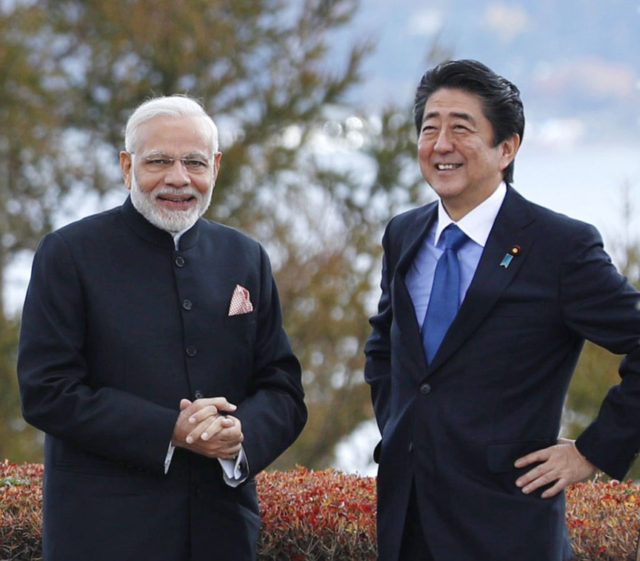Japanese Prime Minister Shinzo Abe concluded his visit to China and returned to Tokyo for a meeting with Prime Minister Narendra Modi on Monday, continuing what Reuters characterized as a “charm offensive” to solidify Japan’s physical security and economic leadership.
Abe was able to work out a $30 billion currency swap with China. He more than doubled that with India, announcing a $75 billion currency swap after meeting with Modi.
Japan and India are also working on a military pact that would greatly extend the reach of Japanese naval forces by allowing them to refuel at Indian bases. Japan and India have begun cooperating on sizable joint military exercises.
Abe referred to Modi as one of his “most dependable friends” and hosted him at a personal residence for dinner, an invitation he has not extended to other visiting foreign leaders, according to the Indian Express.
“A strong India benefits Japan and a strong Japan benefits India,” Abe told reporters.
Voice of America News saw Abe and Modi hammering out a regional alliance that could balance China’s growing regional influence, citing Modi’s history of urging Indo-Pacific nations to join forces.
VOA suggested current U.S. trade policy could be pushing India and Japan closer together as well: “President Donald Trump’s policies that have targeted mostly China with tariffs, but also Japan and other nations, accusing them of unfair trade practices, are working to prod India and Japan to promote their economic ties.”
Such speculation downplays the natural tendency of India and Japan to join forces against China, a point Modi obliquely made by telling reporters, “Without India-Japan cooperation, there will be no development in Asia into the next century.” Beijing would certainly object to that prediction since it has high ambitions and detailed plans for Asian development over the next hundred years.
Modi would be correct in saying there will be little significant development outside China’s sphere of influence if India and Japan do not embrace leading roles in developing an alternative to Chinese hegemony, roles the Trump administration has been urging them to develop since the days of Secretary of State Rex Tillerson. The United States will always have a role to play in the region, but there is simply no way to compete with China in the Pacific without regional powers like Japan in the lead, no matter how “globalist” or “isolationist” any particular U.S. president of the 21st Century happens to be.
Meanwhile, Abe has been developing defense agreements with nations across the Pacific Rim to counter China’s growing military strength and the threat posed by Chinese clients like North Korea. He wants to do business with China as well, but he clearly does not relish coming to the table as a weak power China could dominate through brute force if it wished.
A bullet train project was one of the major topics of discussion between Abe and Modi, highlighting the Japan-India partnership’s desire to field a strong alternative to China’s Belt and Road infrastructure initiative. India’s MoneyControl noted on Monday that Japan and India are hard at work on numerous “connectivity” improvements, ranging from military interoperability to joint infrastructure projects and electronic compatibility.
“It is rare to have a strategic convergence of this order between any two nations and Modi and Abe have built on this convergence by using their personal equation,” MoneyControl concluded.

COMMENTS
Please let us know if you're having issues with commenting.